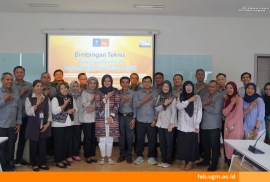
Former Indonesian Trade Minister Gita Wirjawan stated that legal uncertainty and weak policy implementation are the primary factors contributing to Indonesia’s low competitiveness. These conditions hinder the flow of investment, including in the education sector.
Gita Wirjawan gave an example that efforts to improve teacher quality require investment not only in teacher competency training but also in adequate compensation. In addition, he emphasized the urgency of strengthening investment in STEM so that Indonesia can compete in the era of a technology-based economy.
He conveyed this at the 20th FSDE Seminar held by the Economic Study and Discussion Forum (FSDE) FEB UGM at the UGM Innovation and Creativity Centre (GIK) on Sunday (16/11/2025). The seminar was themed “Navigating Structural Bottlenecks in Investment Climate: Toward a Competitive and Resilient Economy of Indonesia”.
Gita Wirjawan also explained how global competition no longer relies solely on military strength, but also on economic capacity, technology, and the quality of education. This imbalance has led to the concentration of global economic power in only a few regions, or polarisation. According to him, the equitable distribution of cognitive abilities through education, improved welfare, and good social conditions is the main requirement for a country, including Indonesia, to remain competitive.
This is what Gita believes to be Indonesia’s weakness. In contrast, Singapore and Vietnam have shown progress in equalising education. He also compared Indonesia with China. Despite having fewer universities, China can contribute to almost half of the world’s academic research, thanks to significant investments, an efficient bureaucracy, and the centralization of strategic sectors. Therefore, he emphasized that Indonesia needs to take similar steps, especially in addressing the brain drain phenomenon from rural areas, which unevenly reduces the supply of quality human resources.
Gita Wirjawan added that Indonesia needs to reduce its dependence on external factors by strengthening domestic consumption. She also emphasised the importance of utilising technological excess from cooperation with China to enhance national technological capabilities.
“Without these efforts, the risk of economic stagnation and imbalance will be even greater,” concluded.
Report: Najwah Ariella Puteri
Editor: Kurnia Ekaptiningrum
Sustainable Development Goals









